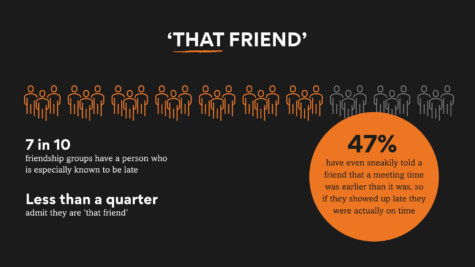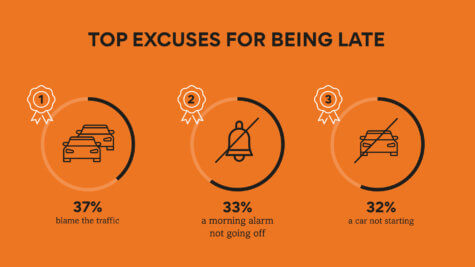NEW YORK — From interviews to first dates, few things are as nerve-racking as a ticking clock when you’re running late. In fact, a new study finds the average adult starts to feel stressed if they are just 10 minutes late for social events or meetings.
The survey of 3,000 U.S. adults finds “early is on time,” with more than half admitting they are “obsessed” with timekeeping.
 The poll shows that respondents consider anything past 13 minutes “late” and an organized 56 percent plan ahead to ensure they are never running behind schedule. Another 60 percent swear by being early, with 39 percent believing it’s socially unacceptable to be late.
The poll shows that respondents consider anything past 13 minutes “late” and an organized 56 percent plan ahead to ensure they are never running behind schedule. Another 60 percent swear by being early, with 39 percent believing it’s socially unacceptable to be late.
Seven in 10 friendship groups have “that friend,” who has a reputation for always being late. However, less than a quarter admit they are that tardy person. Nearly half (47%) have even sneakily told a friend that a meeting time was earlier than it was, so their pal would actually arrive on time. Researchers also find it only takes five times of being late for people to feel upset with others.
European bakery experts St Pierre Bakery commissioned the research ahead of National Brioche Day on May 14.
More than a third pride themselves on being typically early to scheduled social events or meetings. Another 45 percent say they’re usually “on time” and a tenth admit they’re often late.
No pressure to be late during quarantine?
Half of adults claim people criticize them for their time-keeping habits – whether too early or too late. However, living in quarantine over the last year may be changing that. Thirty-five percent say lockdown has made the nation live “slower” and 55 percent add they’re enjoying not having the pressure of being somewhere at a specific time.
“The research shows that the majority of adults firmly put themselves in the ‘early’ camp and are proudly never late,” St Pierre founder Paul Baker says in a statement. “However, the past year has definitely made America live ‘slower’ and find joy in the smaller things like indulging in a favorite food. With life starting to open up again, people might start to put less pressure on timekeeping and just embrace the social moments, even if they start a little late.”
“Whether it’s a little extra ‘you’ time, or indulging in a favorite food – people might start to put less pressure on timekeeping after so long without meeting up, commuting or going on dates,” Baker adds.
Running late? Blame the traffic
The study finds when people are running late, no matter the real reason, 37 percent blame the traffic. A morning alarm not going off (33%) and the car not starting (32%) also make the list of excuses. Americans typically feel anxious (43%), annoyed (36%), and concerned (28%) if it’s looking like they’re going to be late to an event.
Top occasions and events people stress about being late to include job interviews (33%), medical appointments (31%), and getting to the airport (29%). An anxious 24 percent of the OnePoll survey say they would also be concerned about running late to a meet-up with an old friend.
Life without a schedule is even throwing off mealtime
 The past year in and out of lockdowns has changed the general concept of time for 33 percent of adults. In fact, 47 percent said it’s even impacting their mealtimes.
The past year in and out of lockdowns has changed the general concept of time for 33 percent of adults. In fact, 47 percent said it’s even impacting their mealtimes.
More than a third say they now eat when they feel like it rather than at set times. This includes 28 percent having breakfast later than usual and the same number enjoying more “in-between” meals such as brunch.
“The research reaffirms what we already suspected – that food has played a greater part in our day-to-day in the past year than it ever has before,” Baker says. “In fact, 63 percent of Americans are spending more each week on their food shop now than pre-pandemic.”
“The nation has been eager to find new ways to relax and enjoy themselves throughout COVID restrictions; we’ve all been looking to try something new that transports us to a favorite restaurant or overseas holiday. National Brioche Day is a perfect opportunity to do just that,” the St Pierre founder concludes. “As this research shows, taking time to enjoy good food is a joy to be shared.”
